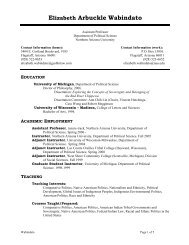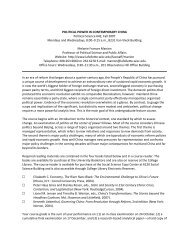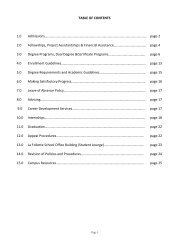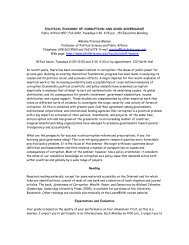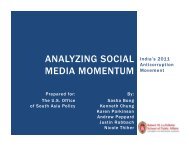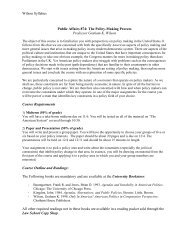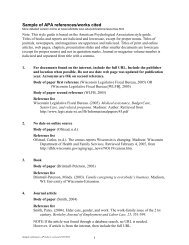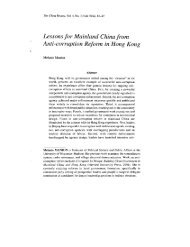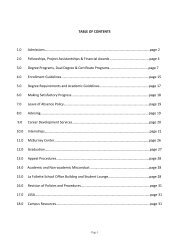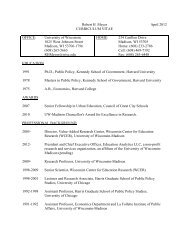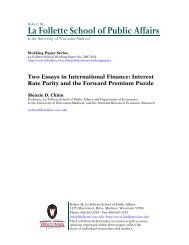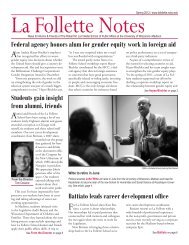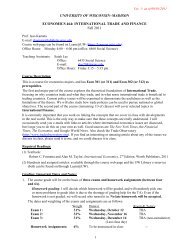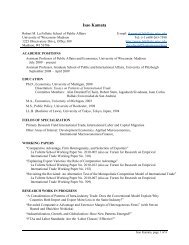SAVE Commission's findings - La Follette School of Public Affairs ...
SAVE Commission's findings - La Follette School of Public Affairs ...
SAVE Commission's findings - La Follette School of Public Affairs ...
Create successful ePaper yourself
Turn your PDF publications into a flip-book with our unique Google optimized e-Paper software.
harder to cross psychological barriers that separate<br />
rural and urban, city and suburb, school<br />
and city hall. This is what taxpayers expect but<br />
too seldom receive. Using the state’s broker<br />
function, questions about service sharing, cost<br />
sharing, growth sharing, joint planning and<br />
regional cooperation can be addressed.<br />
The private sector is an important partner<br />
in community development, especially in<br />
urban settings. The state has to decide where<br />
to help out (such as in siting state facilities) and<br />
where to back <strong>of</strong>f. The “help out” question is<br />
key when state jobs can go to cities and lagging<br />
rural areas, especially now that technology gives<br />
the state and its employees greater work flexibility.<br />
Government success in reaching consensus<br />
is linked to a state budget process that requires<br />
an early, meaningful, consultative and<br />
even partnership role among all levels and<br />
branches <strong>of</strong> government. It is a collaboration<br />
that sees problems, opportunities and infrastructure<br />
as one. No turf. No distrust. No excuses<br />
to avoid cooperation. That’s what taxpayers<br />
expect (see Goal #20).<br />
GRASS ROOTS AND FORMAL<br />
STRUCTURES<br />
Given neighborhood growth strategies, it<br />
may be possible for state agencies to focus resources<br />
from numerous functions such as<br />
school rebuilding, small business assistance<br />
(more and more in the home), Main Street programs,<br />
outdoor recreation, public safety, housing,<br />
community education and urban forestry.<br />
Packaging might happen through an urban land<br />
grant university function (see Goal #13). Research<br />
tells us community infrastructure is connected<br />
and government agencies should behave<br />
that way.<br />
Overall, local government needs attention<br />
and modernization before it lurches into a crisis.<br />
There is value in grass roots neighborhood<br />
democracy, sometimes made easier by computer<br />
networks (from the Information Utility). However,<br />
many local units need to ask whether they<br />
are too small, too remote, or too poor to provide<br />
their own service or pay for independent<br />
overhead. Is the role <strong>of</strong> government to “do”<br />
things, or is it to help things get done?<br />
Should local government continue to fill<br />
technical or pr<strong>of</strong>essional <strong>of</strong>fices through general<br />
elections? Are various boards and councils<br />
too big to be effective? Do we have too many<br />
governmental units? These and other issues<br />
should be debated in a local government statutory<br />
revision commission, concluding its work<br />
by 1998, Wisconsin’s sesquicentennial year.<br />
This Commission recalls the themes <strong>of</strong> the<br />
1977 commission on state-local relations and<br />
financing policy. Giving local government<br />
greater flexibility and autonomy still makes<br />
sense, as does the still-unheeded plea to put<br />
some sense into land use and boundary adjustment<br />
policies. However, a key difference between<br />
then and now is today’s recognition <strong>of</strong><br />
the many stifling layers <strong>of</strong> government and the<br />
realization that government should not be the<br />
sole provider <strong>of</strong> public service. The system looks<br />
more like a web than a layer cake and the web<br />
spinners include citizens, not-for-pr<strong>of</strong>its, business<br />
and government. This is especially true at<br />
the local level. The challenge (as envisioned in<br />
Goal #22) is to have a management system that<br />
strengthens the individual strands <strong>of</strong> that web<br />
and supports the structure as a whole.<br />
Actions<br />
5.1<br />
Create tension and<br />
incentives to encourage<br />
intergovernmental<br />
cooperation.<br />
5.2<br />
Identify an intergovernmental<br />
efficiency broker<br />
function.<br />
5.3<br />
Pay once for local<br />
government service.<br />
5.4<br />
Focus multiple<br />
programs on rebuilding<br />
communities.<br />
5.5<br />
Review the fit between<br />
local government and<br />
new century needs.<br />
E. G. Nadeau,<br />
consultant, Madison<br />
“Local governments<br />
should be cooperative<br />
partners not competitors<br />
for scarce<br />
resources.”<br />
Reuben Harpole,<br />
Milwaukee<br />
“Parks are important<br />
places where we can<br />
gather as a community.”<br />
R E S U L T S<br />
Cooperating communities<br />
will:<br />
1 Require local governments to<br />
focus on service delivery at the<br />
lowest possible cost and not<br />
preservation <strong>of</strong> jurisdictional<br />
boundaries.<br />
2 Reduce the number <strong>of</strong> local<br />
units <strong>of</strong> government whose<br />
existence is based on tradition<br />
rather than function and<br />
efficiency.<br />
3 Allow local taxpayer tax relief to<br />
be based on local as well as<br />
state level savings in the cost <strong>of</strong><br />
government.<br />
4 Increase the equality <strong>of</strong> what<br />
citizens pay for and get by<br />
reducing the parochialism <strong>of</strong><br />
local units <strong>of</strong> government.<br />
5 Change product focus <strong>of</strong> local<br />
government from what it can<br />
provide to its citizens to what is<br />
the most effective way citizens<br />
can get this service.<br />
6 Reduce the cost <strong>of</strong> local<br />
services by lessening<br />
duplication and inefficiencies <strong>of</strong><br />
small scale operations.<br />
7 Change the process <strong>of</strong> local<br />
government from turf protection<br />
to management <strong>of</strong> local<br />
resources and tax dollars.<br />
CITIZEN • COMMUNITY • GOVERNMENT — WISCONSIN: THE 21 ST CENTURY 21



